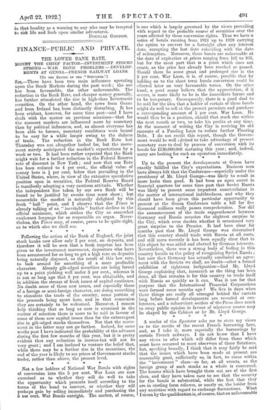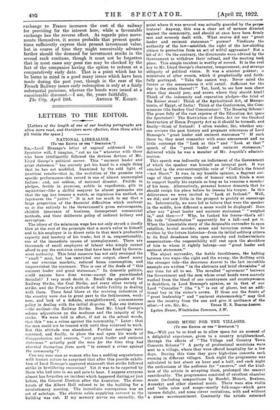FINANCE—PUBLIC AND PRIVATE.
THE LOWER BANK RATE.
BIONHY THE CHIEF FACTOR—INVESTMENT STOCKS STRONG — WAR BOND PROBLEMS — DEVELOP- MENTS AT GENOA—FRENCH RAILWAY LOANS.
(To THE EDITOR Or THE " SPECTATOR."1
Srn,—There have been two main influences operating upon the Stock Markets during the past week ;" the one has been favourable, the other unfavourable. The reduction in the Bank Rate, and cheaper money generally, has further stimulated the rise in high-class Investment securities. On the other hand, the news from Genoa and from Ireland has- been distinctly disturbing. It has been evident, however, for some time past—and I have dealt with the matter on previous occasions—that for the moment markets are influenced more by monetary than by political influences, and, as almost everyone has been able to foresee, monetary conditions were bound to be easy for a while longer owing to the dulness of trade. The reduction in the Bank Rate last Thursday was not altogether looked for, but the move- ment merely anticipated the market's expectations by a week or two. It had been rather expected that the Bank might wait for a further reduction in the Federal Reserve rate of discount in New York ; and now that our Rate has been reduced to 4 per cent., the official value of money here is per cent. below that prevailing in the United States, where, in view of the extensive speculative position open in securities, the Federal Reserve Board is manifestly adopting a very cautious attitude. Whether the independent line taken by our own Bank will be found to be justified by events time must show ; but meanwhile the market is naturally delighted by this fresh " bull " point, and I observe that the Times is already talking of an " inevitable " further decline in the official minimum, which strikes the City as somewhat exuberant language for so responsible an organ. Never- theless, the Times may, of course, prove to be quite right, as to which also we shall see.
Following the action of the Bank of England, the joint stock banks now allow only 2 per cent. on deposits, and therefore it will be seen that a fresh impetus has been given to the investment movement, depositors who have been accustomed for so long to get a high rate on deposits being naturally disposed, as the result of this low rate, to look around for something of a more profitable character. Already gilt-edged securities are being forced up to a point yielding well under 5 per cent., whereas it is not so long ago that 6 per cent. was obtainable, and in addition the stream of fresh issues of capital continues. No doubt some of these new issues, and especially those of a foreign or semi-foreign character, are doing something to stimulate the trade of the country, some portion of the proceeds being spent here, and in that connexion they are certainly to be welcomed. Moreover, I cannot help thinking that so long as care is exercised in the matter of selection there is more to be said in favour of some of these new capital issues than for the extravagant rise in gilt-edged stocks themselves. Not that the move- ment in the latter may not go further. Indeed, for some weeks past I have indicated the probability of the advance during the first few months of this year, but it is pretty evident that any reduction in income-tax will not be very great ; and I am inclined to venture the belief that, while there may be a further rise in the meantime, the end of the year is likely to see prices of Government stocks under, rather than above, the present level. * * * *
Not a few holders of National War Bonds with rights of conversion into the 5 per cent. War Loan are now exercised as to whether they will do well to take the opportunity which presents itself according to the terms of the bond to convert, or whether they will perhaps gain by selling immediately and purchasing the 5 Der cent. War Bonds outright. The matter, of course, is one which is largely governed by the views prevailing with regard to the probable course of securities over the years affected by these conversion rights. Thus we have a series of bonds running from 1924 up to 1928 carrying the option to convert for a fortnight after any interest date, excepting the last date coinciding with the date of redemption. Moreover, these bonds are redeemable at the date of expiration at prices ranging from 102 to .105, but for the most part that is a point which does not count, as the price has already been reached or passed. Should there be some great and prolonged rise in the 5 per cent. War Loan, it is, of course, possible that by holding on to the short term bonds conversion could be effected later on very favourable terms. On the other hand, a good many believe that the appreciation, if it occurs, is more likely to be in the immediate future and to be temporary. Consequently, there is a good deal to be said for the idea that a holder of certain of these bonds might do well to sell at the present premium and purchase a corresponding amount of 5 per cent. War Loan. Ho would then be in a position, should that stock rise within the next month or two, to take his profits at any tire. At the moment of writing the City is reviving its old rumours of a Funding Loan to reduce further Floating Debt. I do not credit this report, though the Govern- ment would be well advised to take advantage of present monetary ease to deal by process of conversion with its bonds for £130,000,000 maturing this year; and, indeed, many are looking for such an operation immediately.
* * * *
Up to the present the developments at Genoa have exactly fulfilled the City's expectations. Business men have always felt that the Conference—especially under the presidency of Mr. Lloyd George—was likely to result in more harm than good. It had been an open secret in financial quarters for some time past that Soviet Russia was likely to present some impudent counterclaims in the matter of international indebtedness, and why they should have been given this particular opportunity to present at the Genoa Conference table a bill for five thousand millions really passes comprehension. Nor did the announcement of the trade rapprochement between Germany and Russia occasion the slightest surprise to the City, which even doubts whether it occasioned very great surprise to the Premier. It had been clear for months past that Mr. Lloyd George was determined that this country should trade with Russia at all costs; and still more recently it has been equally clear that in this object he was aided and abetted by German interests. Nevertheless, there was a strong body of feeling in this country hostile to the policy of recognizing Soviet Russia ; but now that Germany has actually concluded an agree- ment with the Soviets we shall, no doubt—after a formal exhibition of righteous indignation—find Mr. Lloyd George explaining that, inasmuch as the thing has been done, all that remains is for this country to trade itself with Russia as quickly as it can. Was it not for that purpose that the International Financial Corporations were formed some months ago ? We live in days when these things are really all arranged behind the curtain long before formal developments are revealed at con- ferences, and a subservient section of the Press does much to sway public opinion in favour of whatever course may be shaped by the Cabinet or by Mr. Lloyd George.
* * * *
A reader of the Spectator asks me to state my views as to the merits of the recent French borrowing here, and, as I take it, more especially the borrowings by certain French railways. I do not know that I have any views to offer which will differ from those which must have occurred to most observers of these flotations, but, speaking broadly, I think that it may fairly be said that the issues which have been made at present are reasonably good, sufficiently so, in fact, to come within the " investment " class—so far, at all events, as the foreign group of such stocks as a whole is concerned. The houses which have brought them out are of the first class, and they have taken care to see that the security for the bonds is substantial, while the fact that they are in sterling form relieves, or nearly so, the holder from any anxieties with regard to exchange fluctuations. What I mean by the qualification is, of course, that an unfavourable exchange to France increases the cost of the railway for providing for the interest here, while a favourable exchange has the reverse effect. As regards price move- ments themselves, it seems probable that present quota- tions sufficiently express their present investment value, but in course of time they might conceivably advance farther should the demand for investment stocks in the second rank continue, though it must not be forgotten that in most cases any great rise may be checked by the fact of the companies having the option to redeem at a comparatively early date. That is a point which has to be borne in mind in a good many issues which have been made during the past year, though in the case of the French Railway issues early redemption is only at a fairly substantial premium, whereas the bonds were issued at a considerable discount.—I am, Sir, yours faithfully,



































 Previous page
Previous page